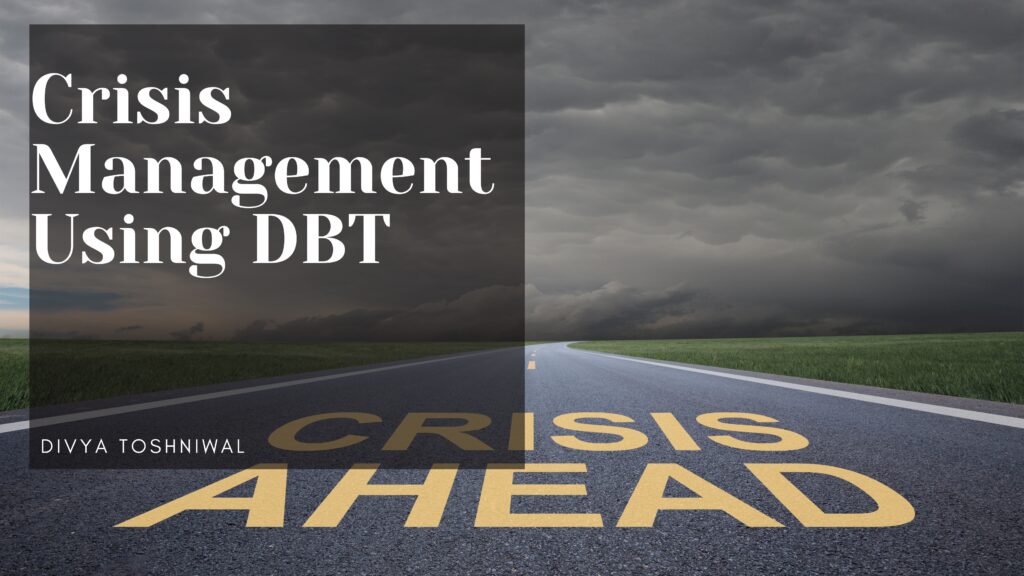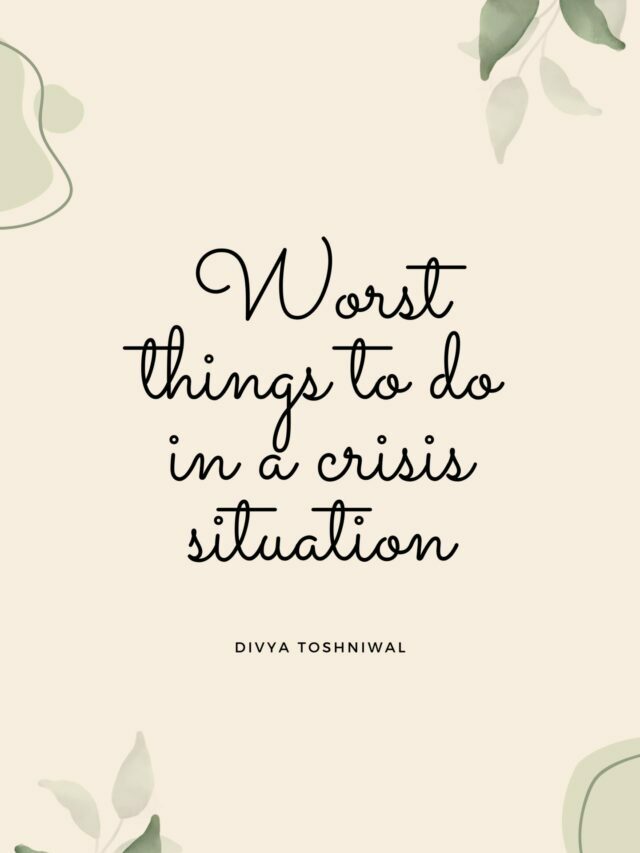Not a single one of us has been devoid of a crisis situation. We have all been in a place where things seem out of hand and we do not really know what to do. We all have a fight-or-flight response in such situations. Some of us may also have a freeze or fawn response. But what is the right way to manage a crisis? Well first of all there is no one right way. But I did find some things when I started reading psychology. I have always focused on using the concepts of psychology in everyday life so that we have the tools to handle any situation before it even arises. This is my attempt to give you a practical approach to crisis management using dialectical behavior therapy.
IN THIS ARTICLE:
- What Is a Crisis Situation?
- Worst Things To Do In A Crisis Situation
- What is Dialectical Behaviour Therapy?
- Crisis Management Using Distress Tolerance Skills of DBT
- Crisis Management Using STOP Skills
- Crisis Management Using Urge Surfing
- Crisis Management using Distraction techniques like – ACCEPTS
- Crisis Management using IMPROVE skills
What Is a Crisis Situation?
To start with let us define what a crisis situation is. In simple words, a crisis situation is any event that has a potentially negative outcome. There can be a number of events in your everyday life that may have negative outcomes, but you will not classify all of them as crisis situations. So to clear that up – a crisis situation can be where –
- There is a potentially negative outcome
- The incident is unexpected
- It can be linked to an emotional turmoil
- It causes interruptions in basic day-to-day functioning
- It has the potential to cause permanent damage
- The knowledge about the situation is limited
Worst Things To Do In A Crisis Situation
What is Dialectical Behaviour Therapy?
DBT is a kind of cognitive behavior therapy that works on evidence-based principles to bring about changes in our personalities and deal with interpersonal conflicts. It also works very well for intra-personal conflicts. DBT uses mindfulness-based strategies to synthesize a balance of acceptance and change. Though generally used to treat personality disorders there are many aspects of DBT that can be used for our everyday conflicts and emotional regulation. There are 4 components of Dialectical Behaviour Therapy:
Mindfulness
Interpersonal Effectiveness
Distress Tolerance
Emotional Regulation
Here we will focus on the distress tolerance skill set of DBT and how it can help us in crisis management.
Warning: DBT is a complex therapy and hence I would not suggest you do self-treatments if the crisis situation is out of your hands. This article is only written to make you aware of the concepts and use it for your regular crisis management situations. If the situations are overwhelming to you, please take professional help.
Crisis Management Using Distress Tolerance Skills of DBT
Pain and distress are part of life but dwelling on a problem is not going to change anything. Also refusing to accept these situations will also lead to suffering. The goal of distress tolerance skills in DBT is to accept, find meaning and tolerate the crisis.
Change causes crisis and crisis causes change.
Hence any attempts at change will produce some sort of crisis in life and hence it is very important for each individual to be able to handle the crisis.
Crisis Management Using STOP Skills
STOP is the Abbreviation for the following steps that you can take in order to have more clarity on the crisis situation and your direction of dealing with it. What actions you take to handle the crisis situation is a secondary matter. The first thing you need to deal with is your own emotions.
- S: Stop: Just pause where you are and try to halt the chain of thoughts that your mind is building. Think about what steps you can take in order to stop the suffering in short term, which may or may not actually bring any change in the crisis. Overthinking is one of the major issues so try to identify your patterns of overthinking and find ways to stop overthinking.
- T: Take a step back: When you are in a situation it is tough to look at things clearly. So, take a step back and look at the bigger picture from a distance. Think about what are the options that can help you reach your goals and survive this crisis.
- O: Observe: Observe the external and internal circumstances. Think about how you feel and what you would like to feel about the entire situation. Observe which thoughts are increasing your suffering in this crisis.
- P: Proceed Mindfully: What are the alternative thought that can help you feel better in this crisis situation? What are the thoughts that can make you feel empowered? These are the questions that you need to mindfully deal with.
Crisis Management Using Urge Surfing
In any crisis situation, you would have some urges to indulge in activities that are listed as worse things to do in a crisis situation above. This skill helps you to deal with that urge.
Urges last generally intense for 20-30 minutes. So when dealing with the urges it is better to let the wave pass. You cannot avoid the wave and you cannot deny it. Hence it is important to be open to your urges. This does not mean I am suggesting that you give in to your urges. This would be devastating. All I am saying is let yourself acknowledge that there is an urge and it is ok to have this urge but every urge doesn’t need to be acted upon. Remind yourself that you do have a choice. Ask yourself what are the benefits of acting upon these urges now. What are the drawbacks of acting upon these urges?
Hold yourself strong for 30 minutes, and let the peak of the wave pass. It is in the nature of the wave to fall down again and hence your urges would be controllable after a span of time too. Divert your attention for those 30 minutes into some other activities. Some of the activities in the next section may help you.
Crisis Management using Distraction techniques like – ACCEPTS
- Activities: Do activities that engage your brain enough to forget about things going on. A few examples include solving a puzzle, cleaning your home, calling a friend, picking up incomplete books or projects, painting, writing, and so on.
- Contributing: Give something to someone else. I have always said that making someone else happy in turn releases happiness hormones for you and hence it makes you feel better even on the dullest of days.
- Comparisons: Comparisons though not always healthy can some times give you relief. So think about how far you have come. Think about where you were a few years ago and how you have developed. Think about people who suffer worse than you. Be grateful for all the things you have.
- Emotions: Cultivate a different emotion in order to overcome one. You can be in charge of your emotions hence when you want to distract your mind focus on the opposite of the emotion you are feeling right now. For example, if you are sad and depressed, just put on some comedy movie that would make you laugh. If you are feeling demotivated, borrow motivation from someone. You can do this by reading about things or by watching a video of people doing that.
- Pushing Away: Sometimes when you are not ready to deal with something it is better to push it away. Not forever, but for the time being it can be the best solution for you.
- Thoughts: Change your thoughts to think about something totally different from what you are currently feeling. Replace the negative emotions by going out of the way to do something totally different like saying the alphabet backward, or listing down all the states in the country.
- Self-Soothing: Soothe your body with the help of sensations. These can be through sight (reading, watching, imagining), smell (aromatherapy or fresh flowers), hearing(music), touch (massage), and taste (food you love). These can give you temporary relief till the time you are ready to regulate your emotions.
Crisis Management using IMPROVE skills
The IMPROVE skills are about improving the moment you are in right now.
- Imagery: Use visualization in order to create happier imagery in your mind. Like imagining your safe space, or successfully dealing with this situation.
- Meaning: Change how you think about the situation. Try to make lemonade with the lemons life has given you. and, if you do not like lemonade then read this.
- Prayer: This may seem a bit old school but we Indians have highly believed in the power of prayers. So at this moment, pray and believe in your prayers.
- Relaxation: Relaxation needs to be done both physically and mentally. You can use active relaxation for your body by working out or dancing. You can also use passive relaxation by sleeping or getting a massage. Meditation is the best option for mental relaxation but music or indulging in a hobby can also work wonders.
- One thing in a moment: Focus on what you are doing right now, and only on that. Mindfulness is a tool that helps a lot to feel better at the moment.
- Vacation: Take a break, if possible go someplace else, and if it’s not possible take at least a mental vacation. Learn to separate work and relations, and take short breaks during the entire day. these things will help you tone down the overwhelming feeling that comes with a crisis.
- Encouragement: Be your own best friend. If your best friend comes to you with a crisis, you don’t panic, you provide them with solutions like a life coach. So, become the same for yourself.
These are some distress tolerance skills from dialectical behavior therapy that you can use for crisis management. If you wish to read more about DBT here are some book suggestions:

